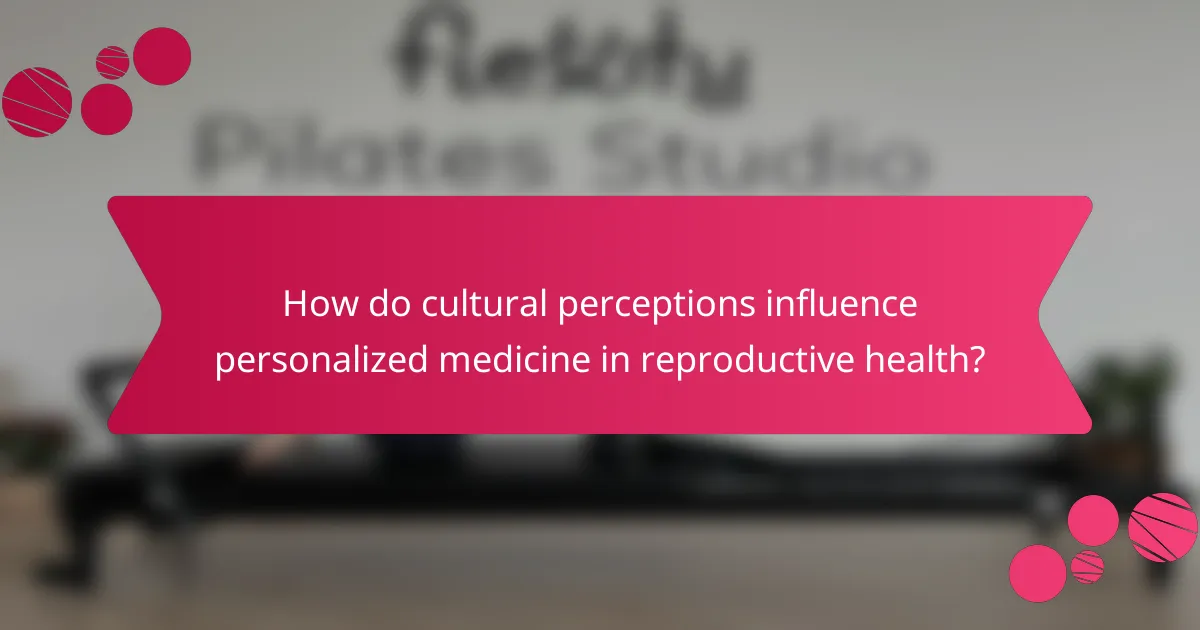Personalized medicine in reproductive health enhances treatment outcomes through tailored approaches. Key strategies include genetic testing, hormonal profiling, and lifestyle interventions. This article explores the benefits of personalized medicine, cultural influences on acceptance, and notable case studies demonstrating improved reproductive health outcomes. Understanding these elements can lead to more effective and individualized care in reproductive health.

What are the key approaches in personalized medicine for reproductive health?
Personalized medicine in reproductive health focuses on tailored approaches to enhance outcomes. Key approaches include genetic testing, which identifies hereditary conditions; hormonal profiling, which optimizes fertility treatments; and lifestyle interventions, which improve overall reproductive health. These methods allow for individualized treatment plans that address unique patient needs. Case studies show significant improvements in pregnancy rates and patient satisfaction through these personalized strategies.
How does genetic profiling enhance reproductive health outcomes?
Genetic profiling enhances reproductive health outcomes by providing personalized insights into genetic risks and compatibility. This tailored approach allows for better-informed decisions regarding family planning and potential interventions.
For instance, genetic profiling can identify carriers of hereditary conditions, enabling couples to assess risks to their offspring. This proactive strategy can lead to targeted treatments, such as in vitro fertilization with preimplantation genetic diagnosis, which screens embryos for specific genetic disorders.
Moreover, genetic profiling can inform lifestyle and environmental recommendations, optimizing reproductive health. Understanding genetic predispositions allows individuals to make informed choices about nutrition, exercise, and other factors impacting fertility.
The integration of genetic profiling into reproductive health exemplifies the shift towards personalized medicine, ultimately improving outcomes for families.
What role do biomarkers play in personalized reproductive medicine?
Biomarkers play a crucial role in personalized reproductive medicine by enabling tailored treatment plans. They provide insights into individual biological responses, enhancing the effectiveness of interventions. For instance, specific genetic markers can predict responses to fertility treatments, allowing for customized approaches. This leads to improved outcomes and reduces trial-and-error in treatment selection. The integration of biomarkers in reproductive health exemplifies a unique attribute of personalized medicine, focusing on individual variability to optimize care.
Which technologies are driving advancements in personalized reproductive health?
Advancements in personalized reproductive health are primarily driven by artificial intelligence, genomic sequencing, and wearable technology. These technologies enhance individualized treatment plans, improve predictive analytics, and facilitate real-time health monitoring.
AI algorithms analyze vast datasets, identifying patterns that inform personalized interventions. Genomic sequencing allows for tailored therapies based on genetic profiles, enhancing treatment efficacy. Wearable devices track physiological parameters, providing insights into reproductive health in real-time.
Together, these technologies represent a unique convergence of data-driven approaches and patient-centered care, fostering a new era in reproductive health management.

What are the main benefits of personalized medicine in reproductive health?
Personalized medicine in reproductive health offers significant benefits, including improved treatment efficacy, reduced side effects, and tailored patient care. By analyzing genetic, environmental, and lifestyle factors, personalized approaches enhance reproductive outcomes. For example, tailored fertility treatments can address individual hormonal profiles, leading to higher success rates. Additionally, personalized medicine can identify potential genetic disorders early, allowing for informed family planning. This approach ultimately fosters a more precise and effective healthcare experience in reproductive health.
How does personalized medicine improve fertility treatment success rates?
Personalized medicine enhances fertility treatment success rates by tailoring interventions to individual patient profiles. This approach considers genetic, hormonal, and environmental factors, allowing for more precise treatment choices. For example, specific genetic testing can identify optimal medication protocols, improving outcomes. Case studies have demonstrated that personalized approaches can increase live birth rates significantly compared to standard treatments.
What are the psychological benefits of personalized reproductive care?
Personalized reproductive care offers significant psychological benefits, including reduced anxiety and enhanced emotional well-being. Tailored approaches address individual needs, fostering a sense of control and empowerment. This personalized attention can lead to improved mental health outcomes, as patients feel more understood and supported throughout their reproductive journey. Additionally, personalized care can enhance patient-provider communication, leading to better decision-making and satisfaction.
Which economic advantages does personalized medicine offer in reproductive health?
Personalized medicine in reproductive health offers economic advantages by enhancing treatment efficacy and reducing costs. By tailoring interventions to individual genetic and environmental factors, it minimizes trial-and-error approaches, leading to faster, more effective outcomes. This efficiency can result in significant savings on unnecessary procedures and medications. Additionally, personalized strategies may lower the incidence of complications, further decreasing healthcare expenditures. Overall, personalized medicine fosters a more sustainable healthcare model in reproductive health.

How do cultural perceptions influence personalized medicine in reproductive health?
Cultural perceptions significantly shape personalized medicine in reproductive health by influencing patient preferences and treatment acceptance. Different cultural contexts affect beliefs about health, disease, and the role of technology in treatment.
For instance, some cultures may prioritize traditional healing practices over modern medical interventions, impacting the integration of genetic testing or personalized therapies. This can lead to disparities in access and adherence to personalized medicine approaches.
Furthermore, cultural attitudes towards reproductive health, such as family planning and fertility treatments, can dictate the willingness to engage with personalized medicine. For example, societies that emphasize family lineage may embrace genetic screening for hereditary conditions more readily than those with differing views on reproductive autonomy.
Ultimately, understanding these cultural dimensions is crucial for developing effective personalized medicine strategies that resonate with diverse populations, ensuring equitable healthcare delivery and improved health outcomes.
What are the differences in patient engagement across regions in reproductive health?
Patient engagement in reproductive health varies significantly across regions due to cultural, economic, and healthcare system differences. For example, in North America, personalized medicine approaches are widely adopted, enhancing patient involvement through tailored treatments and education. In contrast, regions with limited resources may struggle with access to personalized care, affecting overall engagement levels. Socioeconomic factors also play a crucial role; higher income areas typically see better engagement due to greater access to information and services.
How do societal norms affect the acceptance of personalized reproductive treatments?
Societal norms significantly influence the acceptance of personalized reproductive treatments by shaping perceptions and attitudes. Cultural beliefs about family, health, and technology impact how individuals view these treatments. For instance, societies with progressive views on medical advancements tend to embrace personalized approaches more readily. Conversely, traditional views may lead to skepticism or resistance. Acceptance also varies based on education levels and access to information, which affect understanding and trust in these medical options. As a result, personalized reproductive treatments may face barriers in less accepting environments, limiting their utilization and potential benefits.

What unique case studies highlight the effectiveness of personalized medicine in reproductive health?
Personalized medicine has proven effective in reproductive health through various unique case studies. One notable example is the use of genetic testing to tailor fertility treatments based on individual genetic profiles. This approach has led to improved outcomes in in vitro fertilization (IVF) by identifying genetic markers associated with successful embryo implantation.
Another case study highlights the application of pharmacogenomics in managing hormonal therapies for conditions like polycystic ovary syndrome (PCOS). By analyzing patients’ genetic responses to medications, healthcare providers can optimize dosages and minimize side effects, enhancing treatment efficacy.
Additionally, personalized medicine has been instrumental in addressing recurrent pregnancy loss. Case studies show that targeted immunotherapy can improve pregnancy rates in women with specific immunological profiles, offering hope to those with unexplained infertility.
These examples underscore the transformative potential of personalized medicine in reproductive health, tailoring interventions to individual needs for better health outcomes.
Which success stories showcase the use of personalized medicine in infertility treatments?
Personalized medicine has significantly improved infertility treatments, with success stories highlighting tailored approaches. For example, a couple with recurrent IVF failures achieved pregnancy through genetic screening and customized hormone therapy. Another case involved a woman with specific genetic markers who benefited from personalized medication, leading to a successful live birth. These cases demonstrate the effectiveness of personalized strategies in addressing unique reproductive health challenges.
How have specific patient experiences shaped the evolution of personalized reproductive care?
Specific patient experiences have significantly influenced personalized reproductive care by highlighting the need for tailored approaches. These experiences reveal unique patient needs, preferences, and responses to treatments, allowing healthcare providers to adapt strategies accordingly. For example, women with varying hormonal profiles may require distinct medication regimens, leading to improved outcomes. Additionally, case studies illustrate how personalized care has addressed challenges like recurrent pregnancy loss or infertility, enhancing patient satisfaction and emotional well-being. Overall, these insights drive innovation in reproductive health, ensuring that care is responsive to individual patient journeys.

What are the main limitations of personalized medicine in reproductive health?
The main limitations of personalized medicine in reproductive health include high costs, limited access to genetic testing, and variability in patient responses. These factors hinder widespread implementation and effectiveness. Additionally, ethical concerns regarding genetic privacy and discrimination further complicate the landscape. The complexity of reproductive health conditions also poses challenges in tailoring treatments effectively.
What challenges exist in the implementation of personalized reproductive treatments?
Challenges in implementing personalized reproductive treatments include high costs, limited access to genetic testing, and variability in patient responses. Additionally, ethical concerns regarding data privacy and potential discrimination based on genetic information pose significant hurdles. The complexity of integrating advanced technologies into existing healthcare systems further complicates the process. As a result, achieving widespread adoption remains difficult.
How do ethical considerations impact personalized medicine in reproductive health?
Ethical considerations significantly influence personalized medicine in reproductive health by addressing issues of consent, equity, and data privacy. These considerations ensure that patients receive tailored treatments while respecting their rights and autonomy. For instance, informed consent is crucial as patients must understand the implications of genetic testing and treatment options. Equity concerns arise when accessing personalized treatments, as disparities can exist based on socioeconomic status. Data privacy is essential to protect sensitive genetic information from misuse. Balancing these ethical factors fosters trust and enhances the effectiveness of personalized medicine in reproductive health.

What best practices should be followed in personalized medicine for reproductive health?
Personalized medicine in reproductive health should prioritize genetic profiling, tailored treatment plans, and patient education. These best practices enhance treatment efficacy and patient outcomes. Integrating advanced technologies, such as genomics and bioinformatics, allows for precise interventions. Regular assessments ensure adaptability of strategies to individual needs, fostering a patient-centered approach.
How can healthcare providers effectively communicate personalized treatment options?
Healthcare providers can effectively communicate personalized treatment options by utilizing clear, empathetic dialogue and leveraging technology. They should actively listen to patients’ concerns, provide tailored information based on genetic and lifestyle factors, and utilize decision aids to enhance understanding.
Incorporating case studies can illustrate successful outcomes of personalized medicine, reinforcing patient trust. Regular follow-ups ensure that treatment options remain aligned with evolving patient needs. By fostering an open, collaborative environment, providers can enhance patient engagement and satisfaction.
What strategies can patients use to navigate personalized reproductive health services?
Patients can navigate personalized reproductive health services by actively engaging with healthcare providers and utilizing available resources. They should begin by researching options tailored to their specific needs and preferences.
1. Identify personal health goals and concerns.
2. Seek out specialized clinics that offer personalized services.
3. Prepare questions for consultations to clarify treatment options.
4. Utilize genetic testing to understand individual risks and benefits.
5. Stay informed about advancements in reproductive health technologies.
6. Join support groups for shared experiences and insights.
These strategies empower patients to make informed decisions and enhance their reproductive health journey.
